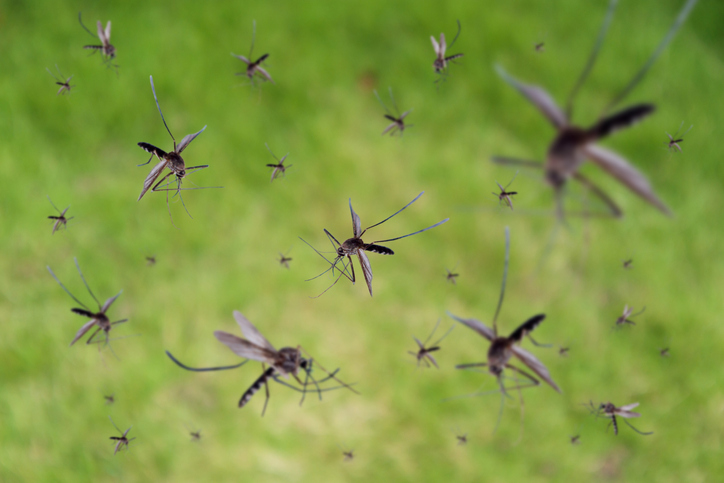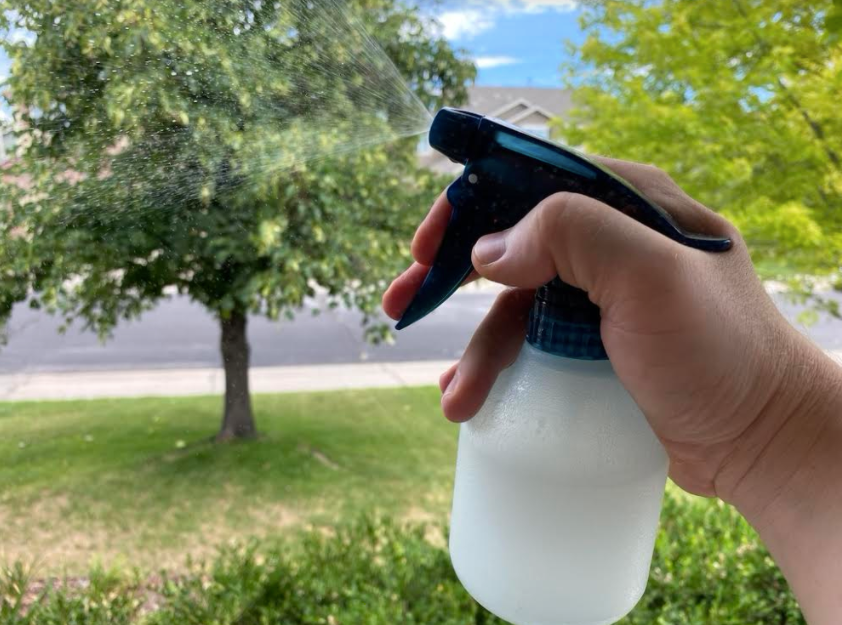
Warmer days have finally arrived.
That means cookouts, cornhole, and swimming.
It also means mosquitoes.
I hate those suckers (pun intended!).
Mosquitoes can ruin a perfectly good outdoor event. They can also spread viruses like West Nile and Zika.
To prevent yourself from getting bitten, you can spray your body with insect repellent. But even when it’s natural stuff you make yourself, slathering that gunk on is annoying.
Ideally, you’d like to not only keep mosquitoes away from your skin, but away from your vicinity in general.
I’ve tried to curb the mosquitoes around my home over the years, but every summer they seem to get the better of me. I’ve made it a goal this year to finally vanquish them. In preparing my ‘squito battle plan, I’ve learned that there are better and worse tactics to employ, and below we break down which common control methods belong in each category.
The Best Mosquito Control Method: Destroy and Treat Mosquito Breeding Grounds
The best thing you can do to control mosquitoes is to disrupt their breeding cycle. You want to prevent these bloodsuckers from laying eggs in the first place.
Mosquitoes lay their eggs in standing water. Still, stagnant water provides mosquito larvae with the bacteria and microorganisms they need for food. So if you want to prevent mosquitoes from laying eggs near your home, you need to eliminate their breeding grounds, i.e., you need to eliminate or reduce all standing water near your home.
Walk around your property once a week and look for standing water.
Flower pots, birdbaths, toys, tree stumps, water features, buckets, and clogged gutters are all potential breeding grounds for mosquitoes.
If you find some standing water, find ways to eliminate it. Clean out your gutters, turn over empty flower pots so that water can’t collect in them, and replace birdbath water regularly.
If you have areas in your yard or garden that don’t drain well, you may need to consider installing French drains or doing some landscaping to encourage better drainage.
If you have standing water that you can’t eliminate, you’ll want to treat it with a mosquito dunk. Mosquito dunks are donut-shaped tablets made of bacteria that only kill mosquito larvae. They don’t kill other insects. They’re safe and last up to 30 days. I put a mosquito dunk in our water feature in our front garden. I’m also going to start putting one in an area in our garden where water tends to drain slowly.
Mosquito dunks are cheap and can be bought at Walmart, hardware stores, and Amazon.
Eliminating and treating mosquito breeding grounds is the most effective way to reduce mosquitoes around your property. What’s more, it’s the cheapest and safest way to do so. This should be your go-to line of defense in controlling mosquitoes around your home.
If you need a proof of concept that this method works, look no further than Disney World in Orlando, FL. The place was built in the middle of what used to be a mosquito-infested swamp, but the park has no mosquitoes despite not using pesticides.
How do they do it? They ruthlessly guard against having any (untreated) standing water in the park. No mosquito breeding grounds; no mosquitoes.
Adequate Methods of Mosquito Control
Eliminating and treating mosquito breeding grounds can go a long way in controlling mosquitoes around your home. But it’s not foolproof. Mosquitoes are wily suckers. They can find not-so-obvious places on your property to lay eggs. The bit of water that collects in the depression of a leaf is sufficient for a mosquito to lay its eggs.
Try these mosquito-control measures if you still have a mosquito problem after eliminating breeding sites:
Mosquito Barrier Treatment. A mosquito barrier treatment is an insecticide spray applied to areas around your home where adult mosquitoes feed and rest. The spray is applied to leaves, shrubs, grass, trees, and around your home’s doorways. Adult mosquitoes that come into contact with a surface that has been treated with the insecticide spray will die a short time later.
The treatment lasts for up to a month and has been shown to reduce mosquito activity.
There are a few downsides to employing a mosquito barrier treatment. First, it’s not something you can typically do on your own. You’ll likely have to hire a professional to come and apply it. And these professional treatments can be pricey. Look to spend $65-$100 a month on them.
Second, mosquito barrier treatments may contribute to mosquitoes developing insecticide resistance.
Third, mosquito barrier treatments also kill non-target insects, including pollinators like butterflies and bees.
Use mosquito barrier treatments sparingly and only after you’ve done your best to eliminate and treat mosquito breeding grounds.
I’ve tried mosquito barrier treatments in the past. I think it may have reduced our mosquitoes a little, but not enough that they stopped being a nuisance, and not enough to justify the $99/month charge.
Mosquito Foggers. Mosquito foggers use heat to create a thick white fog of insecticide that drifts through shrubs and leaves to kill adult mosquitoes.
Mosquito foggers only provide temporary relief from mosquitoes. They only kill the adult mosquitoes that get hit with the insecticide-laden fog they emit. After a fogging session, you’ll get a few hours to up to a day of mosquito relief. Foggers are great to use before an outdoor event like a pool party or BBQ.
The downside to foggers is that they do kill other non-target insects like butterflies and bees. Take that into consideration if you decide to use one.
Mosquito foggers can be purchased at all hardware stores. Application is pretty straightforward, but you need to consider a few factors before applying:
- Apply when adult mosquitoes are most active. Usually, that’s at dawn and dusk.
- Don’t apply in the middle of the day. The heat will cause the insecticide to volatilize and drift upward out of target areas.
- Don’t apply when it’s windy. The insecticide will just blow away.
I’ll occasionally use a mosquito fogger in the morning when we have a backyard social event planned for later that day. It seems to do the trick in reducing mosquitoes, but yes, it’s only a temporary fix.
A Simple Fan. Mosquitoes are weak fliers. The air from a fan will do a decent job of keeping mosquitoes away from you. If you’re looking for temporary relief from mosquitoes while you’re outside at a cookout, just run a fan. It doesn’t cost anything, doesn’t require spraying chemicals around, doesn’t kill other insects, and will also keep you cool on a hot, humid night.
Less Effective Methods of Mosquito Control
Mist Systems. In recent years, automated mist systems that spritz out mosquito insecticide throughout the day have become popular among homeowners. It’s a set-it-and-forget-it solution for mosquito control.
However, there isn’t a lot of research out there on the effectiveness of these mist systems. Studies suggest that the systems only reduce mosquitoes near spray nozzles. Also, wind activity in your area can blow the insecticide out of your backyard, reducing its efficacy in eliminating mosquitoes on your property.
There are also concerns that the frequent misting of these systems is creating insecticide resistance in mosquitoes. And besides killing mosquitoes, the insecticide kills insects like bees and butterflies as well.
Furthermore, misting systems are pretty dang expensive to install; look to spend $2,500 to $4,000 in setting one up, depending on the size of your property. Some misting systems are also prone to frequent breakdowns, so many homeowners spend even more money maintaining their system after it’s installed.
Due to the lack of research supporting their efficacy and their high cost, along with the potential of increasing insecticide resistance and killing pollinating insects, automated misting systems aren’t considered an effective way to control mosquitoes.
Bug Zappers. You’ve likely seen a bug zapper hanging around your grandpa’s back porch or near the outdoor dining area of a lakeside restaurant. The idea is simple. A UV light attracts an insect to the zapper. When the mesmerized insect comes into contact with it, they get electrocuted to death.
If you’ve looked in the tray of a zapper, you’ve likely seen some mosquito carcasses. So zappers work for controlling mosquitoes, right?
Well, no.
Researchers have found that of the bugs killed by zappers, only 1% to 6% are mosquitoes. The vast majority of insects killed by bug zappers are butterflies, bees, moths, and flies. They also kill insects that prey on mosquitoes. This is likely why the U.S. Department of Agriculture has found that your chances of getting bit by mosquitoes actually increase when you’re in the vicinity of a bug zapper. Kill mosquito predators —> more mosquitoes —> better chance of getting bit.
The scientific consensus is that bug zappers should be avoided.
Citronella Candles. Citronella candles and tiki torches have been used for decades to keep mosquitoes away from pool parties and backyard cookouts. But if you’re like me, you’ve likely noticed that they don’t do much to repel mosquitoes. I still get chewed up when we burn one.
That’s because citronella candles don’t really work. An essential oil from a plant called Cymbopogon nardus, citronella does repel mosquitoes, but the concentration of scent emitted from a candle isn’t enough to keep mosquitoes at bay. Also, wind can just blow the scent away from your area. The mosquito-repelling effect you do get from burning a citronella candle likely just comes from the smoke itself and not the scent. You’d get about the same mosquito protection by burning a regular candle.
Check Your Local Agricultural School for More Mosquito Fighting Tips
If you’re looking for more tips on controlling mosquitoes in your area, I highly recommend visiting the website of your nearby agricultural school. Each part of the country has different mosquito seasons and even mosquito breeds. The tactics you use may need to be tweaked depending on where you live. Researchers at ag schools are constantly updating their websites with battle-tested tactics for controlling mosquitoes in your area.







